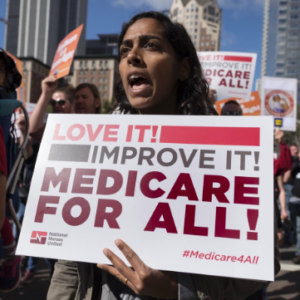Given America’s wealth, it would be hard to design a health care system that fails more completely than ours.
It’s time to get rid of our high-cost, low-performing system and replace it with something better.
The good news is, we already have the kernel of that system: Medicare. If we improve Medicare and expand it to cover all Americans, then we could simultaneously save money, give everyone better treatment and provide health care as a right. The even better news is that the public is fast rallying around the idea of improved and expanded Medicare-for-All — and the strongest and most detailed Medicare-for-All legislative proposal has just been introduced in the U.S. House of Representatives with a record level of support.
In the United States, we pay more — much more — for health care than other rich countries. We spend roughly twice what other rich countries spend on health care.
We pay more, but we get less — much less. Among rich countries, we do the worst job of providing health care coverage. Every day, 100 Americans die not from medical conditions but from a lack of treatment. They are killed by a heartless system that rations care based on ability to pay. Nothing like that happens in other rich countries.
Among rich countries, we have the greatest problem of under-insurance. One-third of adults report a cost-related access to health care problem in the past year. They stayed away from the doctor, or did not fill a prescription, or skipped a follow-up treatment. Cost-related barriers to care are five times worse in the United States than in the United Kingdom.
And we have some of the worst health outcomes. Our infant mortality rate is 25 percent higher than in Canada. It is practically triple the rate in Japan. We rank 43 among the world’s nations for life expectancy, behind Cuba, Costa Rica and Chile, among others.
We know we can do better, because Medicare already does better. And the new Medicare-for-All proposal introduced by Rep. Pramila Jayapal, D-Washington, not only would ensure every American was covered but it would improve on existing Medicare. The legislation would eliminate co-pays and deductibles, provide for dental care and cover long-term care, including nursing home care.
We can do all this at no additional cost compared to our current health care spending.
The largest savings from Medicare-for-All would come from eliminating needless and incredibly expensive bureaucracy. The key would be to move away from per-treatment billing. Instead, hospitals and other medical providers would receive an overall payment based on the patients they serve and the treatments they provide, and then they could get on with the business of providing care. The arrangement would be no different than the ways police stations or public libraries are funded; libraries don’t send a bill to the city treasurer each time a person checks out a book. The potential available savings are tremendous. Administrative costs consume an astounding 25 percent of U.S. hospital spending, for example, far above most comparable countries, due largely to the costs of billing.
Other massive savings could be obtained by empowering Medicare to negotiate the price of prescription drugs. Refusing to permit Big Pharma to set whatever prices it chooses and instead relying on price negotiations in a Medicare-for-All system could save $200 billion every single year.
There’s no reason the United States should tolerate a health care system that fails its purpose of provide health care to every person while practically bankrupting the nation and literally bankrupting half a million American families every year.
There’s no reason we should tolerate such a system, but there’s a reason, and only one reason, we do: the dominant political power of the health insurance, pharmaceutical and hospital industries. Big Pharma alone spends more on lobbying that any other industry, by far.
But all of the money from the insurance industry, the drug corporations and the for-profit hospitals can’t hold back the will of the people, if we are organized and mobilized. The Jayapal bill shows what we can do if we work off of Medicare and try to design a system that aims to advance health and deliver care, rather than increase corporate profits. It won’t be long before we win it.

